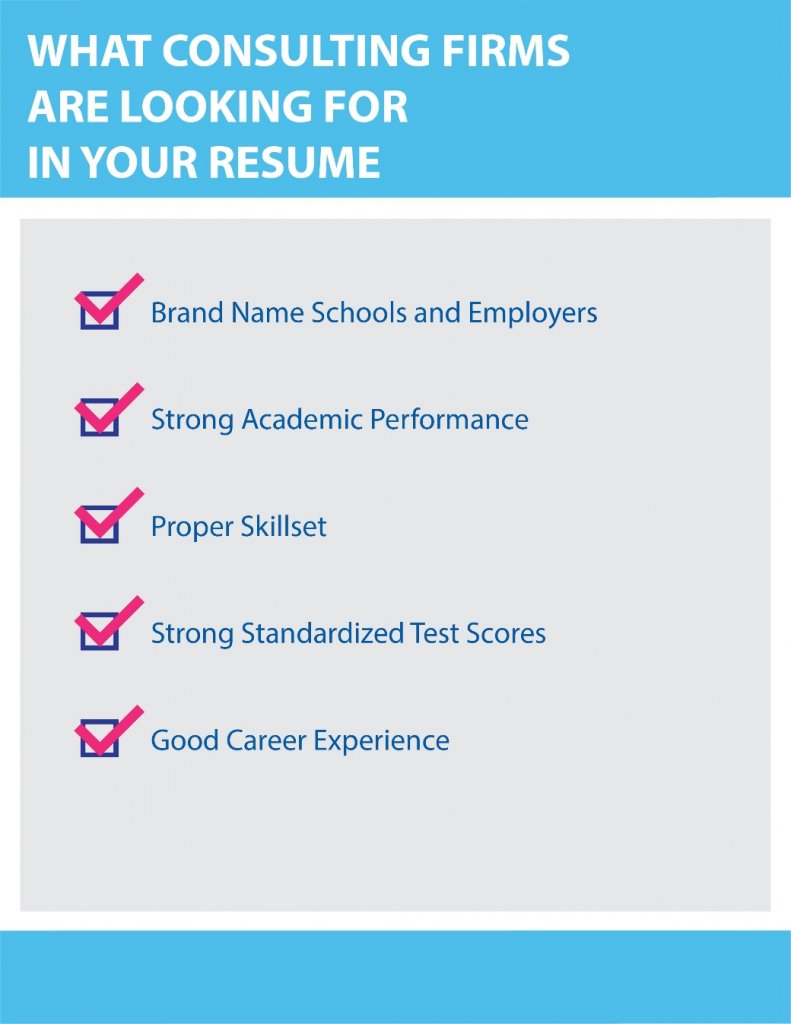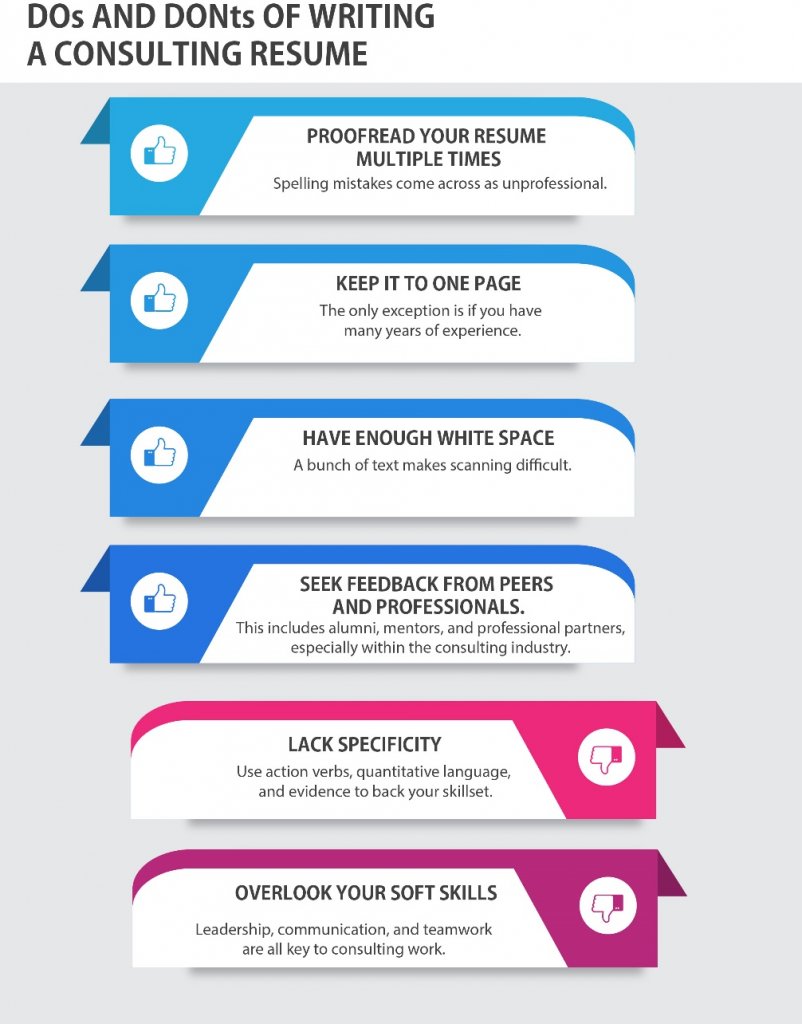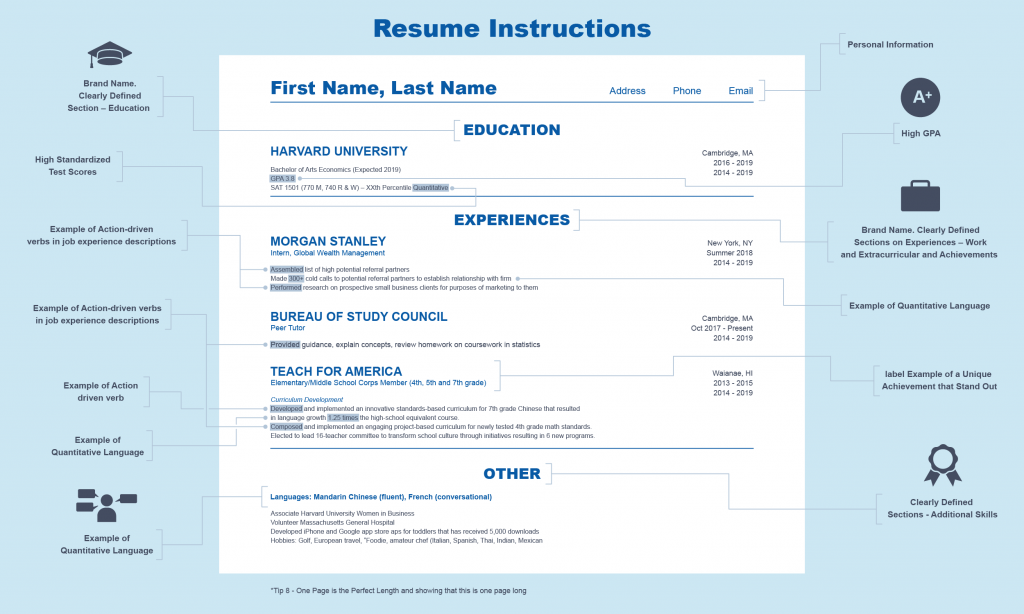For almost any professional job, applicants are required to provide a resume and cover letter to demonstrate their qualifications. Your resume is one of the most important documents during the application process, as it acts as a summary of your education, experience, and skillset.
In the consulting world, your resume is even more important. The top three consulting firms — McKinsey, Bain, and BCG — have acceptance rates of less than five percent during any given year. The resume screening step is where most applicants are eliminated. This goes to show just how important it is to write a strong consulting resume when applying to be a consultant.
FREE Resume Tips Email and Video Series
This form collects your name and email so that we can add you to our email list that delivers the free resources you are requesting. Check out our privacy policy for details on how we protect and manage your submitted data.
We’ll never spam you or share your email. Unsubscribe at any time.
A management consulting resume is different from your standard resume. The difference is not just in terms of format, but content, style, and overall approach. You probably know that the role of a consultant encompasses many different skillsets. A management consultant is a problem-solver, a data expert, and a communications professional, all bundled into one. Because consultants handle complex tasks using many different approaches, firms will be looking at your resume to determine if you have what it takes to be a successful hire. So, what goes into writing the perfect consulting resume? This piece will cover four essential guidelines that you should follow when preparing your resume for a consulting opportunity. By following these steps, you will be in a much better position to impress your employer and secure an interview.
1. Understand What Consulting Firms Are Looking for in Your Resume
In order to write a resume that will get you the interview, you must understand what top consulting firms look for when reviewing candidate applications.

These top firms care less about the proper format than they do about the qualifications and accomplishments that each candidate has. During resume screening, top consulting firms will pay attention to the following components of your resume:
- Brand Name Schools and Employers
The truth is that top consulting firms do care about which schools you attended and which employers you’ve worked for. They have a strong bias for brand name schools and employers that stand out to them and their clients. In fact, it’s the attention that the clients of the firm give to brand name schools that cause the interviewer to pay the same attention to your education background.
It’s not uncommon for a client seeking consulting services to be charged over $500,000 a year. As you would expect, such clients would want to ensure that any consultants working on their project are adequately qualified. Boasting a BS from Yale or an MBA from Harvard certainly adds points, even as a junior consultant working on a major project.
This doesn’t mean that you can’t get a consulting position if you went to a non-target school. However, if you have such brand names on your resume, make it easy for people to see.
- Academic Performance
Consulting firms also pay attention to academic performance. They want to know how you rank in your class and whether you have what it takes to tackle complex consulting projects. Therefore, include your GPA to differentiate your resume from others.
MBA applicants should include their GMAT scores and MBA GPA to be easily seen on their resume.
- Specific Skills Relevant to the Profession
Top consulting firms want to know that you have soft skills, including leadership and communication. While working in the profession, you will need to be able to handle difficult personalities, lead a team, and communicate important information in a manner that people can easily understand. Therefore, make sure you list experiences that demonstrate any leadership and communication experience, among other essential skills.
Activities that demonstrate such skills include job and internship responsibilities, extracurricular activities, and specific experiences that speak to these skills.
- Standardized Test Scores (Especially in Math)
Because grading can vary from one institution to another, top consulting firms would like to see your performance in standardized testing. High performance further strengthens your academic qualifications and shows consulting firms that you have what it takes to be a successful hire. Make sure you include high SATs, GRE, GMAT, MCAT, or LSAT scores in your resume.
- Career Experiences
Consulting firms want to see your career experiences, accompanied by what you achieved during your time in each position. Remember that these firms compare how long your career was with how much you achieved. You may need to show more accomplishments after working for eight years compared to one year.
Regardless of the number of years in a position, follow an achievement-based approach when describing your job. This means emphasizing outcomes, quantifying them, and highlighting parts of your job that apply most specifically to the consulting position in question
2. Properly Format Your Resume
Knowing what top consulting firms expect from your resume, is just the beginning of resume writing. While it does form a solid foundation to build upon, you should also know how to present your academic, professional, and extracurricular skills in a consulting resume.
A lot of this comes down to proper formatting. And by formatting, I don’t mean margins, font size, and columns. Rather, proper formatting refers to presenting your qualifications in a manner that the resume screener can easily identify.
Here are key points to remember when formatting your resume.
- Emphasize Brand Names
Make sure the brand name schools you attended, or big companies that you interned with, are clearly mentioned near the top of your resume. Have them in a bold font right after the name and contact information section.
- Proudly Display a High GPA
Along with brand names, include your high GPA right next to the school and program information. Remember that resume screeners are doing just that: screening your resume. If you make your distinguishing qualifications hard to find, you may be overlooked.
- One Page Does the Trick
This is perhaps the biggest caveat to consulting resume writing. How do you condense so many experiences and qualifications into just one page?
Starting early is key. Take time to reflect on your most relevant experiences, how you’ll allocate bullet points, and how you can play around with margins and line spacing to fit everything on one page. While this may sound challenging, it’s possible — unless you have many years of experience across multiple fields (which you can extend to a second page).
- Have Clearly Defined Sections
A typical consulting resume should be split into five clearly defined sections:
- Personal Information
- Education
- Work Experience
- Extracurricular Experiences and Achievements
- Additional Skills
While you don’t have to follow this format religiously, make sure the information you include covers all sections mentioned above. More importantly, don’t forget about your extracurricular achievements. This section gives you the opportunity to demonstrate important skills such as leadership, teamwork, and entrepreneurship.
- Use Action-Driven Verbs
When your resume is being screened, you have only seconds to attract the attention of your resume screener. So, it is essential that you give some thought to word choice. Start each bullet point with an action verb such as “lead,”“initiated,”“solved,”“saved,” etc. This will attract attention to your specific achievements and make you stand out from other applicants.
- Emphasize Language Skills
If you can speak multiple languages, you may stand out to consulting firms. A firm may view you as an asset for a specific market they’re targeting. Because consultancy is becoming global in today’s world, being fluent in more than one language can set you apart from other applicants.
- Keep It Simple
Remember that not all resume screeners are familiar with your specific field of work. Therefore, avoid industry-specific jargon when describing your accomplishments. Simplify this information in a manner that anyone can easily understand when reading through your resume.
- Demonstrate a Variety of Skills
Avoid falling victim to writing an incomplete resume. How could this happen? If you’ve been working as an engineer for many different companies, don’t include the same job responsibilities repeatedly throughout your resume. Instead, highlight unique experiences that demonstrate your diverse skillset. More importantly, emphasize your achievements rather than your daily responsibilities.
- Use Quantitative Language
The consulting field is driven by data. Numbers, quantities, and other similar information can attract attention to your skillset. As you outline achievements in your professional career, present them using quantified data backed by numbers.
For example, you could state how you developed a quality management system that resulted in lower production costs, from $40 per unit to $30 per unit (or something similar).
3. Stand Out from the Crowd
As you write a consulting resume, remember that you’re looking for any opportunity to stand out from thousands of other applicants. Similarly, resume screeners are looking for what makes you different.
Personal accomplishments such as distinguished scholarships, Olympic medals, or presidential honors can be the accomplishment that sets you apart from another similarly qualified candidate.
If you’ve done smaller, yet unique activities that others haven’t done, also include these in your resume. The goal is to take every opportunity to stand out from the competition.
4. Avoid Making Simple Mistakes
As you finalize your consulting resume, make sure you keep the following Dos and Don’ts in mind. These pointers can help you avoid common, easy-to-prevent mistakes so that you can submit an outstanding resume.
- DO: Proofread your resume multiple times.Spelling mistakes come across as unprofessional.
- DO: Keep it to one page. The only exception is if you have many years of experience.
- DO: Have enough white space.A bunch of text makes scanning difficult.
- DO: Seek feedback from peers and professionals.This includes alumni, mentors, and professional partners, especially within the consulting industry.
- DON’T: Lack specificity.Use action verbs, quantitative language, and evidence to back your skillset.
- DON’T: Overlook your soft skills.Leadership, communication, and teamwork are all key to consulting work.

As you can see from these tips, writing a consulting resume is different from a standard resume for other types of jobs. A consulting resume requires attention to detail, focus on your unique skillset, succinct language, and an achievement-based approach. Writing the perfect consulting resume is not as easy as many people think. It takes lots of time and attention.
Resume Example
Here is an example resume that highlights the tips I’ve mentioned. Reference this example as you create your resume to make sure that you hit all of the important sections. With the exception of your brand name schools/employers and GPA, these items do not need to appear in the order I have them listed. But, make sure that they are all represented in your resume.
Below is an example consulting resume. You can also download the example by clicking here.

More Resources:
FREE Resume Tips Email and Video Series
This form collects your name and email so that we can add you to our email list that delivers the free resources you are requesting. Check out our privacy policy for details on how we protect and manager your submitted data.
We’ll never spam you or share your email. Unsubscribe at any time.




127 thoughts on “Consulting Resume – The Ultimate Guide on How to Write the Perfect Consulting Resume”
Victor,
Most of the questions asked focus on people with MBAs and PhDs but I was wondering how consulting companies looked at degrees like MDs/DOs? I am currently a medical student and was wondering what the process would look like for me/what would you look for a medical candidate who was curious about a career in consulting.
All the Best,
Aakash
Aakash,
Firms, McKinsey especially, do hire MD types. They are great with health care clients. Process is similar as PhD recruiting process generally. Expectations and qualification criteria are similar.
-Victor
Hi Victor,
2 questions.
1. I have been a telecom consultant – technical and strategy related for 10 years now – working for the biggest operators and vendors over 3 different continents. I am 33 years old. Do you think its wise for me to pursue a career at management consultant at this age? I just did my MBA (Distance Learning) from Warwick.,
2. I was interested to buy your consulting resume package. Do you think it will be beneficial for me, considering I am going to apply for a ‘experienced position’? And is LOMS aimed to help experienced candidates like me?
Ok, thats 3 questions!
Thanks!
Ch.
Sir,
I seem to have different circumstances than most on here. I was a cop in the military for 12 years. I was in a leadership position, managing people and projects. I earned a bachelor’s in Business Administration while I was in, with a GPA of 3.4, from a cheap online school. The military stressed a degree, but they didn’t care where from. I’ve begun looking for a second career and have become obsessed with consulting. I don’t have any delusions of grandeur. I don’t think that I will ever get a chance to be a part of MBB. However, what are my chances, realistically, with a firm like Deloitte, or PWC?
John
Hi victor,
I have three years of work experience consulting for a non-profit and a year for the World Bank. I have MPhil in Econ from Cambridge, 3.96 CGPA in my undergrad and 800 on my Math GRE score. Do you think my profile is strong enough for McKinsey?
Best,
NE
NE,
Short answer is: yes.
-Victor
Two Questions.
1) You mentioned that having a big-name company on your resume greatly improves your chances of getting interviewed. Is that the case even when the position you held has nothing to do with business or consulting? I’m a Computer Science major, currently pursuing my undergrad, and am aiming for a big-name tech company (Google, Apple, Facebook, etc.) internship next summer. Is an internship like that likely to help me in getting a consulting position post-graduation, or should I try to get some more business-related experience in instead?
2) Standardized Tests. Sometimes when I read about consulting I get confused on what’s expected of those applying post-undergrad, as it seems like most material is written for MBA’s. Do firms (specifically big 3 firms) look for standardized tests from undergrads? If so, does it make a difference whether they take the GMAT or GRE?
Joe,
1) Yes a big brand name employer in a non business role is desirable. It’s not your business experience they want. They can teach you that. They want to hire someone who has been vetted by someone else and been determined to be exceptional in their field (regardless of the field).
2) More important you score high than which standardized test. GRE, GMAT, SAT, LSAT, or MCAT all fine.
-Victor
Hi, I am a prospect Oxford MBA candidate. But my GMAT is slightly on the lower side (Q45 V35). I want to work in Strategy consulting. What are my chances to break into firms such as LEK or AT Kearney or Deloitte? Do you think my GMAT is still low for these firms?
Dear Victor,
I’m a PhD candidate at Johns Hopkins University. My undergraduate gpa is >3.9 (from a good university in China). But my graduate gpa is somehow low (~3.3). Will this be a major burden when applying for consulting positions? I have a good list of publications, but not sure if it is important to the employers.
Best,
Nicole
Did you get an interview invite or the 3.3 GPS did not cut it?
Hi Victor,
I’m wondering how realistic getting a job at a top consulting company would be for me. I’ll graduate from Clemson University in May with a B.S. in Economics and a B.A. in French and International Trade. I have a 3.63 GPA and a summer internship at VCE with their Business Process Group. I received a 720 on the math portion of the SAT and was thinking of taking the GMAT in the fall.
Do you think there’s hope?
Thanks,
Courtney
Courtney,
For a top 3 firm, I’d say no chance without a top 5 MBA.
For the rest of the top 10, I’d says it’s a maybe. Best bet would be the strategy arm of a former accounting firm with a local office near your school where alumni from your school work there. If there are alumni there, it’s possible.
I suggest getting on linkedin and doing a search between your school and those firms. If you find some, then you would want to network your way into those forms. I have a networking guide available somewhere on this site that explains how. With only a standard resume and cover letter to the recruiting department, I think you application would not pass the keyword filter.
Your strongest asset is the math SAT score. A similar score on gmat would be confirmatory evidence. The issue is Clemson is not a target school for most firms. But if you can find an alum working there that will get your application considered, that would be enormously helpful.
I think top 11-25 and boutiques would be your best bet. Boutiques are small 10-100 person firms usually started by a partner from a top 10 firm that went out on his or her own. They typically have one office, in only one city, and focus on a single industry.
Victor
Hi Victor! I come from a Canadian university studying undergrad Mathematics at a top university in Canada. My GPA system uses percentage. What does 3.5 translate to around? Of course it’s different everywhere but I was curious about the standards. I thought 3.5 was like a B ?
Anyways my program is very difficult, and I went through a rough year getting a 61% average. However in 2nd and 3rd year, I’ve been getting a 90% average. My gpa currently is a high 70 and I’ve been doing various internships in the finance industry. Will I have a chance at MBB. I am sure if I get the interview I can make the cut, it’s just I’m worried about my GPA and don’t know how to compare since I am canadian student. I’d probably work in MBB firms in toronto if picked.
Hi Victor,
I loved your article!! I have a question though. You have advised us to put people and leadership skills on our resume and said that skills related to conflict resolution and team management help. I have such experiences on-job, but don’t know how to put them on resume. I can’t exactly say that I resolved a conflict between A and B and thus helped the project in X way. Please advice on how to put such experiences on resume
Apurva,
Use words like manager, work with colleagues, team member, etc… Use words that describe how you interact with people in general. This is especially the case if your job title tends to imply you stare at a computer all day and don’t normally interact with people.
Victor